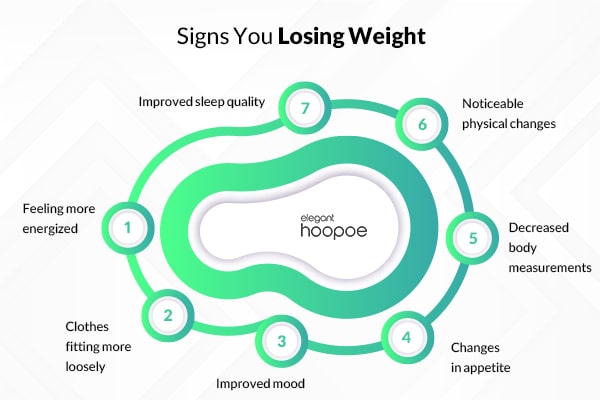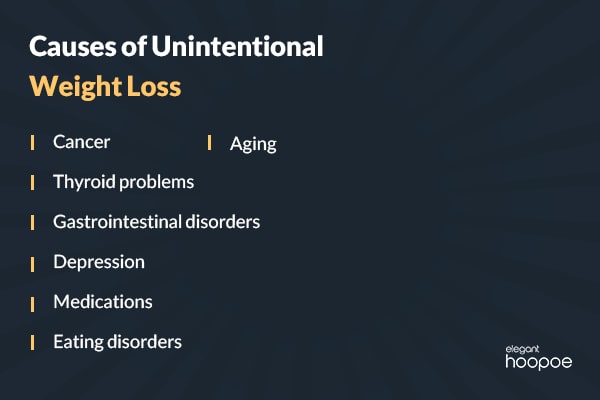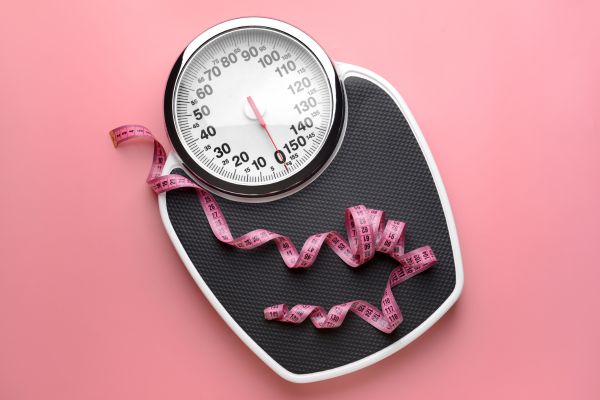What Are the Small Signs You're Losing Weight?
Wondering about the small signs of weight loss? These subtle changes can indicate progress:
- Looser clothes and smaller body measurements, like a slimmer waist or face
- Increased energy and fewer food cravings
- Better mood, improved sleep, and reduced joint pain
- Enhanced confidence from intentional weight loss via diet and exercise
- Possible health concerns if unintentional, with signs like fatigue, appetite changes, or fever requiring medical attention
Losing weight is a very common agenda that can be achieved through regular exercise, a strict diet regime, and by implementing altered lifestyle modifications. Weight loss can, however, occur even on account of unsuspected underlying health issues; hence it always helps to take note of the signs and symptoms of unintentional weight loss.

Recognizing the Signs of Weight Loss: Physical and Health Changes to Look For
Weight loss is accompanied by certain signs that include changes in appetite or manner of eating, increased weakness or fatigue, changes in bowel movement, and changes in the appearance or texture of the skin. In addition, unintentional weight loss can be linked to other signs such as fever, night sweats, or constant pain.
Less bloated, improved digestion, and reduced symptoms like constipation and acid reflux; improved sleep quality and reduced symptoms of sleep disorders like sleep apnea; reduced pressure on your joints and hence alleviated joint pain; clear skin, more confidence—these are all small signs you’re losing weight, encouraging you to step into your weight loss path.
Always remember that weight loss is a slow process and that sometimes it may not be visible to all or takes some time to manifest some signs. One also needs to remember that it is not always about weight loss but being healthy. Sometimes, weight loss doesn’t even signify health improvement, so that’s another reason to track the signs.

Small Signs You’re Losing Weight
Although the first signs of weight loss vary among individuals, here are several signs you’re losing weight:
- More energized: Undeniably, one of the prime advantages associated with weight loss is to have more energy, since it makes the performance of every type of physical activity considerably easier. You will literally quite feel your energy exploding by the time you start losing weight since you are eating better and exercising more frequently.
- Looser clothes: If you have been having worn smaller clothes or your clothes feel looser, or you have started making use of belts to hold up your outfits where you used not to, then that can be a sign of weight loss.
- Better mood: Weight loss can improve your mood and make you less demanding.
- Fewer food cravings: Most people develop less of an appetite when they start losing weight.
- Smaller body measurements: If you are becoming smaller at the midriff, waist, hips, and other body measurements, that is a good early sign of weight loss.
- Physically noticeable changes in your body: A slimmer face, less belly fat, more defined muscles.
- Better sleeping: Shedding a few pounds might help improve your quality of sleep and even be helpful in sleep disorders like sleep apnea.
Weight gain or loss can be either intentional or unintentional. Unintentional weight loss is almost always an indication of some hidden medical condition. If you are losing weight rapidly or excessively and you are not trying to lose weight, you must speak with your doctor to rule out the development of any underlying disorder.
Intentional vs. Unintentional Weight Loss
Intentional weight loss would then refer to a case whereby an individual loses weight purposively, often combining healthy eating with regular exercise (Here you can read about best weight loss exercises). One may do this for reasons such as getting better health, achieving the desired level of fitness, or other personal reasons. Basically, intentional weight loss is usually a positive and healthy decision and tracking the signs encourages you to keep going.
On the other hand, unplanned weight loss is when an individual loses weight without intention, again making it urgent to watch for any signs for your own good. This might be an indicator of some occult health problems, such as, for example, cancer, thyroid disorders, and gastrointestinal diseases.
Weight loss can also be a side effect of medication or a symptom of mental health diseases that involve depression or eating disorders. Unexplained weight loss must, therefore, be taken seriously through the signs since it may be caused by some life-threatening condition requiring serious medical attention.
Symptoms of Unintentional Weight Loss
If your clothes suddenly hang loosely on you, this can be a sign that you are experiencing unintentional weight loss. The signs of unintentional weight loss are many and varied, but among the more common ones include:
- Diminished appetite or eating habits change: Unintentional weight loss is sometimes linked with the loss of appetite or a shift in the type of food that one desires or can consume.
- Weakness or fatigue: In case one is getting tired or becoming weaker than usual, then it is most probably a clear indication that his system lacks enough nutrients resulting from unintentional weight loss.
- Changes in bowl movements: Unintentional weight loss may also be accompanied by changes relating to bowel movements that highly feature diarrhea or even constipation.
- Change in skin appearance or skin texture: You may feel you are losing weight as the skin starts looking different or has become dry, saggy, or less resilient than before.
- Other symptoms: Along with all the signs of losing weight mentioned above, unintentional weight loss can also be accompanied by symptoms such as fever, sweating during the night, and chronic pain.
Note that unintentional weight loss often is a symptom of some serious underlying medical condition; therefore, you are advised to see a doctor if you develop the following signs.

Causes of Unintentional Weight Loss
There are many potential causes of unintentional weight loss, some of which include:
- Cancer: Unintentional weight loss can be an early sign of certain types of cancer, such as pancreatic or lung cancer.
- Thyroid problems: Hyperthyroidism, or an overactive thyroid gland, can cause unintentional weight loss due to an increase in metabolism.
- Gastrointestinal disorders: Conditions such as celiac disease, inflammatory bowel disease, or chronic diarrhea can cause unintentional weight loss.
- Depression: Depression can cause a loss of appetite and changes in eating habits, leading to unintentional weight loss.
- Medications: Some medications, such as chemotherapy drugs or certain antidepressants, can cause unintentional weight loss as a side effect.
- Eating disorders: Conditions such as anorexia nervosa or bulimia can cause significant and dangerous weight loss.
- Aging: As we age, our bodies may become less efficient at absorbing nutrients, leading to unintentional weight loss.
When to Be Concerned About Unintentional Weight Loss
Unintentional weight loss can be a cause for concern, more so if it is significant or very rapid. If you have lost over 5 percent of your body weight in six to twelve months without trying to, you need to seek medical help. Furthermore, seek medical advice if you’re experiencing the following signs or symptoms along with unintentional weight loss.
- Persistent fatigue or weakness
- Loss of appetite or alteration in eating patterns
- Changes in bowel movements or color of the stool
- Persistent pain or discomfort
- Fever or night sweats
- Changes in skin appearance or texture
These are, potentially, very serious symptoms and therefore should be investigated as quickly as possible to help avoid further health complications. Your health professional will identify what may be causing your unintentional weight loss and work on treatment based on those reasons.
Related article: Best Herbs for Weight Loss
Common Symptoms of Intentional and Unintentional Weight Loss
Signs of intentional and unintentional weight loss may overlap, making the cause difficult to determine. Such overlapping weight loss signs include the following:
- Clothes pack loosely: Both will have the same results—whether a person lost weight intentionally or not, now that the clothes pack loosely over the body.
- Changes in Appetite: This involves the change in appetite, and this might be indicative of a change in body weight that is instigated by typical eating habits or atypical eating habits, as well as eating low-calorie-dense foods.
- More activity: Intentional and unintentional weight loss can both be a function of increased activity, which includes exercise.
- More energy: When one is losing weight due to purposeful dieting or even unintentional weight loss, he shall have more energy from being more active or maybe just eating better.
- Better health: The ultimate result in both cases of intentional and unintentional weight loss would entail some ways through which health could be improved, such as prevention of diabetes by controlling blood sugar and risk of heart disease.
Treatment of Unintentional Weight Loss
The type of treatment for unintentional weight loss depends upon the cause of the condition. The basic step in unintentional weight loss is treatment of the underlying medical condition, especially if it has been caused due to some acquired medical condition. Medication or other forms of treatment may sometimes be necessary to keep it under control and stop one from losing more weight. In the event of weight loss due to loss of appetite or trouble eating, establish mechanisms to provide improved nutrition and weight gain. This would entail:
- Small, more frequent meals throughout the day
- High-calorie, high-density food intake as frequently as possible
- Drinking high-calorie, high-protein liquids, such as smoothies or meal replacement drinks
- Increasing appetite with medications and herbal appetite stimulants
- Work with a nutritionist to develop a meal plan and regimen of nutritional supplements.
In some cases, supplemental help may be needed to achieve weight gain with the help of a professional, either to overcome some psychological or emotional issues that relate to food intake or to undertake some strength training exercises in order to build up muscular mass. Consult a health professional to rule out any cause for unintended weight loss and develop an appropriate treatment plan.
Effective Non-Surgical Treatments for a Sculpted and Toned Body
Looking ahead toward getting a sculpted and toned body, many of the non-surgical treatments of muscle toning could work quite effectively against cellulite and improve the look of skin. These include EMS therapy, in which electrical impulses are used to contract the muscles and tighten them to deal with the cellulite problem.
This would also include radiofrequency and ultrasound cavitation treatments, collapsing the fat cells and tightening the skin to such a much smoother and contoured appearance. Cryolipolysis, more popularly known as fat freezing, targets and kills fat cells; hence, obvious signs of weight loss will show, including reduced cellulite and much more defined muscles. These are non-invasive treatments with minimal time commitments, and results can be seen, hence the best options for people who seek to have effective treatments that really work without surgery in muscle toning and cellulite reduction.

More About Weight Loss
Dangerous and unintended weight loss can be indicative of a hidden medical condition; it’s not something to be taken lightly. Consultation with a professional in health will be necessary should a person experience fast weight loss. They will be able to determine what the cause is and provide a proper treatment plan. Several possible causes of unintended weight loss are cancer, thyroid problems, gastrointestinal disorders, depression, certain medications, eating disorders, and even the process of aging.
Treatment of unintentional weight loss will depend upon the cause, which may include treatment of the medical condition, improvement in nutrition, and promotion of weight gain and building of muscle mass with strength training exercises. If you are concerned about your weight loss, speak with your healthcare professional for guidance and support.
Want to hit your weight loss goals, to get the body of your dreams? Our slimming center in Dubai is always ready to help you achieve these. Feel free to contact Elegant Hoopoe today for more information about our programs and let the realization of a healthier and happier you begin!
Physical and emotional changes during weight loss
Weight loss is a process that changes a person physically and emotionally simultaneously. Understanding these changes will help you get through the process and keep fit and healthy. Here’s an in-depth view of the physical and emotional changes one goes through in the weight loss journey, backed by some reputable sources.
1- Physical Changes
Metabolic Adjustments:
- Initial Weight Loss: When you start losing weight, the first thing that you lose is water weight. This occurs because the stored form of glucose is glycogen, and it is bound to water in your muscles. So, while you’re burning glycogen for energy, the water goes into your system, and you lose a lot of weight within the first couple of weeks.
- Fat Loss: As you go further, your body starts to use your fat for energy. This is more gradual but sustainable. This loss in fat may result in loss of inches of the body with an increase in muscle tone.
Muscle Mass:
- Preservation of Muscle: If you combine weight loss with strength exercises, it preserves your muscle mass. Because muscle is metabolically active, it means that it will burn more calories while at rest compared to fat.
- Greater Strength: Exercise, especially resistance training, allows for the growth in muscle mass and, therefore contributes to better health.

Hormonal Alterations:
- Leptin and Ghrelin: These are the hormones that regulate hunger and sensations of satiety. In the procedure for weight reduction, levels of leptin decrease and will, therefore increase hunger sensations. Nonetheless, this will be regulated by normal patterns of intake of a healthy diet.
- Insulin Sensitivity: Weight reduction enhances insulin sensitivity and thus reduces the possible risk for type 2 diabetes.
Cardiovascular Health:
- Blood Pressure and Cholesterol: Reduction in weight can lower blood pressure and cholesterol, therefore significantly decreasing the risks of heart disease.
- Improved Blood Circulation: Improving cardiovascular health enhances circulation, thus improving blood supply to the tissues and delivery of oxygen.
2- Emotional Changes
Enhanced Self-Esteem:
- Body Image: You will feel more confident and positive about your body image with weight reduction. Increased self-esteem results in better overall psychological well-being as a person.
- Success: This feels like success and therefore motivates for making and meeting other personal goals.
Fluctuation in moods:
- Initial Euphoria: At the beginning of a weight loss regime, many people experience initial feelings of elation and high motivation. These feelings tend to ebb and flow over some time.
- Plateaus and Frustration: Plateauing with weight loss can be very frustrating and may make one feel like giving up. Stay focused on the long-term health benefits; it’s not short-term results that matter.
Relationship with Food:
- Mindful eating involves most parts of weight loss, getting onto a healthier relationship course with food. This will involve ways in which one can practice mindful eating by being preoccupied with hunger and satiety cues and enjoying their food without guilt.
- Emotional eating: The measures for fighting emotional eating need to be discussed. Many people use food as a way of coping with stress, boredom, or even sadness. Individual coping mechanisms would help a person to look and deal with such triggers holistically.
Social interactions:
- Support Systems: Having a support system that includes friends, family, or weight loss groups will have your back, encourage you, and keep you liable.
- Social Challenges: Food is always present at social events. Learn how to get through them and stay on track with weight loss.
Mental Health:
- Weight loss is related to improved mental health, as it decreases symptoms of depression and anxiety. Exercise has been associated with an improved mood and decrease in stress.
- Cognitive Function: Improved physical health relates to better cognitive function—memory, concentration.
Strategies for Managing Changes
Realistic Goal Setting:
- SMART Goals: Strategy to specify, measure, achieve, relevant, and time-bound will help to stay focused and motivated.
- Small Steps: The weight loss journey can be less overwhelming and more possible to achieve in smaller steps.
Building Healthy Habits:
- Solid Routine: A steady routine of meals and exercise can assist in maintaining weight loss and preventing relapse.
- Balanced Dieting: Emphasize a balanced diet that is full of all nutrients; these will help in overall good health.
Professional Guidance
- Therapists and Dietitians: Putting some input of both therapists and dietitians would help give the individual professional support and advice of how to act; this would be cognitive behavior treatment and would help a great deal with the emotional eating and then healthy habits to follow.
- Medical Supervision: In people who have a lot of weight to lose, this would put them under close medical supervision to ensure the weight loss for them is as safe and effective as possible.
Weight
Height
Age

Monitoring and measuring weight loss
Monitoring and measuring weight loss is integral to any weight management journey. It not only takes account of one’s progress but also serves to provide encouragement and an overview of the effectiveness of the different methods applied. Understanding these different ways of monitoring and measuring weight loss can help one make better decisions for better results.
Simplest Method for Tracking Weight Loss
The simplest method used in tracking weight loss is through a scale. This is the easiest way to do things, but one needs to realize that this number on your scale doesn’t always reflect the whole picture. Water retention, muscle gain, and even time of day are some of the reasons for any fluctuation in weight. Hence, it is best to weigh at the same time every day, preferably in the morning, for an honest idea of where one stands. You will also notice that a digital weighing scale that expresses your body fat percentage will go a step further to explain changes in your body composition, usually a more important indicator of good health than weight alone.
Monitor Weight Loss

Measurements of the body also serve well to monitor weight loss. There are circumference measurements for parts of the body like the waist, hips, thighs, and arms. These measurements can give you an idea of exactly where the actual fat loss and muscle gain is taking place within your body. For example, you could be losing inches around your waist, and that normally shows fat loss, while not really seeing it on the scale. Take these measurements once a week and write them down to keep track of how you are over time.
Another technique or equipment by which the body fat could be estimated is through the body fat calipers. This requires pinching of the skin and fat at specific body points using the calipers to measure the thickness. It is, however, associated with a fair amount of accuracy while requiring practice and consistency to get proper results. It is frequently used by fitness professionals and athletes to track changes in their body composition.

Weight Monitoring
Weight monitoring requires both physical measurements and checking on dietary intake and levels of physical activity. It may help to keep honest and be able to make better choices by writing down what is eaten in a food diary or by using a mobile app. These can also provide information on eating patterns and identify themes where changes are likely to be needed. Similarly, one can monitor his or her physical activity by using a fitness tracker or even a simple log that helps guarantee one meets the recommended exercises in staying active.

Self-monitoring
Self-monitoring is a useful technique in weight management. This involves a continuous process of observing and recording eating and exercise behaviors. It is followed up with feedback on these behaviors. The practice increases self-awareness and can act as an ‘early warning system’ if problems develop.
For example, in case you tend to eat too much during weekends, then you can take some steps not to let it become a too huge and jarring issue.
Realistic And Attainable Goal-setting
Another major stage in weight loss monitoring is realistic and attainable goal-setting. A person should set short and long-term goals and ensure they are in SMART form: that is, specific, measurable, attainable, relevant, and time-bound. This helps keep the motivational level up and therefore gives one a very clear map towards one’s weight loss journey. The small milestones achieved should be celebrated to keep one confident and motivated. Some psychological parameters also prevail in weight loss. Monitoring emotional and mental status is as important as monitoring changes physically.
Though Positive Thinking
Sometimes, one can get frustrated with weight loss mainly due to slow progress. Keep in mind, though—positive thinking and keeping one’s eye on the greater target of overall health, as compared to the actual number embraced on the scale. Other is to seek inspiration from friends, family, or even professionals when one feels the need to, or to discuss any emotional issues one may have in relation to trying to shed off some weight. Monitoring and measures of weight loss, for example, include a number of means which give the general clear view of the progress. Having achievable targets and probing deep into the psychological triggers is also an equal determinant of long-term success. Using these techniques, you’ll know those that work for you and those that don’t in your journey of weight loss. You will be inspired to reach your health and fitness goals.
Diet and lifestyle tips for weight loss

Weight loss is a life-long challenge with regards to making some changes in diets and lifestyles. Based on the most credible sources, summed up are the following practical tips to run by.
Firstly, let’s talk about diet. It should be balanced. It means a variety of foods that provide nutrients needed and exclude high empty calories. Imagine how satisfying and nutrient-dense it is to fill your plate with fruits, vegetables, lean proteins, and whole grains. For instance, many foods that are high in dietary fiber include beans, oats, and vegetables, which help to keep you satisfied for longer periods while simultaneously harboring other benefits toward suppressing calorie intake.
Reducing Added Sugars
Reducing added sugars is another crucial step. Added to most foods and drinks, this ingredient may be the cause of weight gain and other health issues, such as diabetes and heart disease. Instead, try to satisfy your sweet tooth with natural options like fruits. And don’t forget—sometimes sugars hide in foods where you least expect them, so check the nutrition labels.
Healthy Fats Are Friends
Healthy fats are friends, too. Not all fats are devil incarnate. Plus, including foods rich in healthy fats, like avocados, nuts, and olive oil, will help you not just feel fuller for longer but also help control the magnitude of the cravings. Plus, these fats are good for your heart and overall health.
Mindful eating changes the game because one is fully present in what and how one is eating and derives pleasure from every bite, listening to the signals from the body about hunger and fullness. Try to eat without distractions like TV or your phone. This can help you recognize when you’re full and prevent overeating.
Physical Activity
Physical activity is yet another important part of the equation. Regular exercise is a tool to burn calories and increase your metabolism through the building of muscle. This proper mix should be a combination of aerobic-based activities like brisk walk, running, or cycling and muscle-strengthening activities. The aim should be to attain a minimum of 150 minutes of moderate-intensity aerobic activity during a week, or 75 minutes of vigorous-intensity activity, and on two or more days of the week, muscle-strengthening activity should also be conducted.
Ensure you are hydrated
Consuming water before meals helps reduce the number of calories taken, as it creates a feeling of fullness in an individual. In some instances, we get confused since the body mistakenly perceives our thirst sensation as hunger; therefore, it is essential to have a proper perception of thirst to avoid unnecessary snacks.
Sleep Well
And then the other piece of this puzzle is sleep. Hormones – they’re basically the things that turn down hunger and appetite – can get messed up with poor sleep. So, when you’re not sleeping, well, you eat a little bit extra. 7-9 hours of good, quality sleep per night is what you shoot for when losing weight.
Stress Management
Stress management is also key. Chronic stress can lead to emotional eating and a craving for high-calorie comfort food. Try to reduce stress with the help of activities like yoga, meditation, or deep breathing exercises in order to manage weight more effectively.
Set Realistic And Achievable Goals
Setting realistic and achievable goals paves the way for success in the long term. Do not aim to lose body fat at a very rapid rate; instead, target habits that are tenable. Setting small, gradual goals in itself can help make the behavior changes needed to accomplish them. For example, if you target to lose between 1 and 2 pounds in a week, it’s usually safe and attainable.
Be In A Weight Loss Group
This support can really make a big difference. Be it friends, family, or a weight loss group, one would want to show themselves and attain more achievement. Sharing goals and updating others on your progress can help you stay on track and overcome challenges.
Finally, weight loss success comes through diet and lifestyle adjustment. You should focus on nutritionally well-rounded diets, less added sugar, good amounts of healthy fats, be mindful of what you eat, upsurge the physical activities, hydrate yourself adequately, sleep well, reduce stress, have realistic goals, and support one another in the process. These measures will go a long way to help you lose weight and keep it off while improving your overall well-being.
Medical Insights and Concerns for Weight Loss

Health Benefits:
- Better Cardiovascular Health: Weight reduction can decrease blood pressure, improve cholesterol levels, and further the control of blood sugar to reduce the risk of heart diseases and diabetes.
- More Agile Motion: Weight loss reduces the pressure on the joints of a person. This is particularly helpful for people who have joint problems or arthritis.
Possible Concerns:
- Rapid Weight Loss: Very restrictive diets or excessive exercise may lead to muscle loss, nutritional deficiencies, and other health problems. A generally recommended rate of weight loss is about 1-2 pounds per week.
- Psychological Effect: Although weight loss enhances one’s self-esteem and elevates mood, it can also be stressful and anxiety-provoking if the process becomes too restrictive or obsessive.
Medical Conditions:
- Underlying Medical Conditions: Diseases like hypothyroidism, polycystic ovary syndrome, and even certain medications can impede weight loss. This should be ruled out and controlled by the individual through the help of a healthcare provider.
Eating Disorders:
- Signs to watch for: eating disorders can be indicated by an excessive preoccupation with food, body image, or exercise. If these signs appear, it is incumbent to seek professional help.
Long-term Sustainable Approach:
- Gradual weight loss means that the process of losing weight is safe and will stick; this reduces the risks of ill health. Keeping these medical insights and concerns in mind can help you approach weight loss in a healthy and informed way.
Exercise and fitness routines
Designing an effective exercise routine that will contribute to health and fitness requires a well-thought-out exercise and physical activity plan. Here are some tips from the most valid sources of ideas on how to create a workout routine that is balanced and sustainable.
Importance of Regular Exercise
Regular exercise is essential for living healthy. According to the U.S. Department of Health and Human Services, adults are recommended to participate in at least 150 to 300 minutes of moderate intensity aerobic physical activity each week, or 75 to 150 minutes of vigorous-intensity aerobic physical activity each week. Muscle strengthening activities must be done at least twice a week.
Components of a Balanced Workout Routine
Aerobic Exercise:
Aerobic exercises, such as walking, running, cycling, and swimming, are some of the most important cardiovascular activities. They improve cardiac and respiratory performance, enhance endurance, and burn calories. CDC recommends mixing moderate with vigorous aerobic activities for most benefit.
Strength Training:
This would involve weight lifting, resistance band exercises, and various bodyweight exercises such as push-ups and squats, to gain or sustain muscle mass. According to the American College of Sports Medicine, strength training should involve all major muscle groups and be done at least twice a week.
Flexibility and Stretching:
Flexibility exercises, which include stretching and yoga, maintain joint range of motion and prevent injury. Stretching major muscle groups at least two to three times a week keeps the muscles supple and flexible and may reduce stiffness.
Balance Exercises:
Balance exercises are crucial in older adults to prevent falls and improve stability. Tai chi and yoga, as well as certain exercises targeting improvements in balance, enhance coordination and strength.
Sample Workout Summary
The following is a sample 7-day workout summary, containing all the elements of an exercise program:
- Saturday: 45 min moderate-intensity aerobic exercise (e.g. cycling) + 15 min flexibility exercises
- Sunday: Rest or light activity only (e.g., leisurely walk, gentle yoga)
- Monday: 30 minutes of moderate-intensity aerobic exercise (e.g., brisk walking) + 20 minutes of strength training (upper body)
- Tuesday: 30 minutes vigorous-intensity aerobic exercise (e.g., running) + 15 minutes of flexibility exercises (stretching or yoga)
- Wednesday: 30 minutes of moderate-intensity aerobic exercise + 20 minutes of strength training (lower body)
- Thursday: 30 min balance exercises (e.g. tai chi, yoga) + 15 min flexibility exercises
- Friday: 30 min vigorous-intensity aerobic exercise + 20 min full body strength training
Tips for Keeping It Going

Make Realistic Goals:
Setting real and achievable targets may be useful in motivation building. This might mean running a certain distance, lifting a certain weight, or attending the gym a certain number of times each week—having a clear goal will help you stay on track.
Track Your Progress:
The workout log, coupled with apps designed for fitness logging, helps you keep track of the activities done and thus serves as a means to keep the individual accountable. Getting to see what improvements you have made over time is always very motivating.
Do What’s Enjoyable:
Do things that you enjoy, and you will remain in the action. It could be dancing, hiking, swimming, or even a game; just do something which you may like. Therefore, if you exercise regularly, it is not much of a chore.
Mix It Up:
Getting a good variety of exercises can fight off boredom by bringing versatility into your workouts. From trying new kinds of workouts to changing your routine, push your limits with different activities.
Nutrition and Hydration:
Proper nutrition and hydration are definitely required to ensure optimum performance and recovery. Ensure to consume a balanced diet that is rich in its nutritional content and drink enough water throughout the day. Rest and Recover: Allow your body enough time to rest and recover, as it is a part of the injury prevention and performance-enhancing processes. This would also include rest days off from exercise and making sure to listen to your body.
By following these guidelines and working a variety of exercises into your routine, you will be working toward well-balanced and well-rounded fitness that will benefit overall health.









